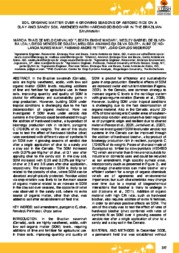Soil organic matter over 4 growing seasons of aerobic rice on a clay and sandy soil amended with hardwood biochar in the brazilian savannah.
Soil organic matter over 4 growing seasons of aerobic rice on a clay and sandy soil amended with hardwood biochar in the brazilian savannah.
Author(s): CARVALHO, M. T. de M.; MADARI, B. E.; LEAL, W. G. de O.; SOUZA, D. M. de; SOLER, M. A. da S.; MAIA, A. de H. N.; PETTER, F. A.; MEDEIROS, J. C.
Summary: In the Brazilian savannah (Cerrado), soils are highly weathered, acidic, with low soil organic matter (SOM) levels, requiring additions of lime and fertiliser for agricultural use. In these soils, improving quantity and quality of SOM is pivotal for efficiency and sustainability gains in crop production. However, building SOM under tropical conditions is challenging due to the fast decomposition of organic material. Here we investigated if SOM levels under aerobic rice systems in the Cerrado could be enhanced through the addition of hardwood biochar, a by-product of bioenergy production rich in resilient, pyrogenic C (70-80% of its weight). The aim of this study was to test the effect of hardwood biochar (char) rates combined with different rates of synthetic N on SOM over 4 growing seasons of aerobic rice after a single application of char to a sandy and a clay soil in the Cerrado. The SOM increased with 0.07% per Mg ha-1 of char, at 0.1 year after applying char to the sandy soil. In the clay soil, SOM increased with 0.26 and 0.23% per Mg ha-1 of char at 2.5 and 3.5 years after char application, respectively. The increase in SOM is likely to be related to the porosity of char, where SOM can be absorbed and physically protected. Residue added via crop rotation was likely to be the main source of organic material related to an increase in SOM in the clay soil over seasons, the opposite of what was observed in the sandy soil, where no extra source of organic matter, other than char, was added to soil after establishment of field trial.
Publication year: 2013
Types of publication: Paper in annals and proceedings
Unit: Embrapa Rice & Beans
Keywords: Arroz, Cerrado, Matéria orgânica, Oryza sativa, Solo, biochar
Observation
Some of Embrapa's publications are published as ePub files. To read them, use or download one of the following free software options to your computer or mobile device. Android: Google Play Books; IOS: iBooks; Windows and Linux: Calibre.
Access other publications
Access the Agricultural Research Database (BDPA) to consult Embrapa's full library collection and records.
Visit Embrapa Bookstore to purchase books and other publications sold by Embrapa.

